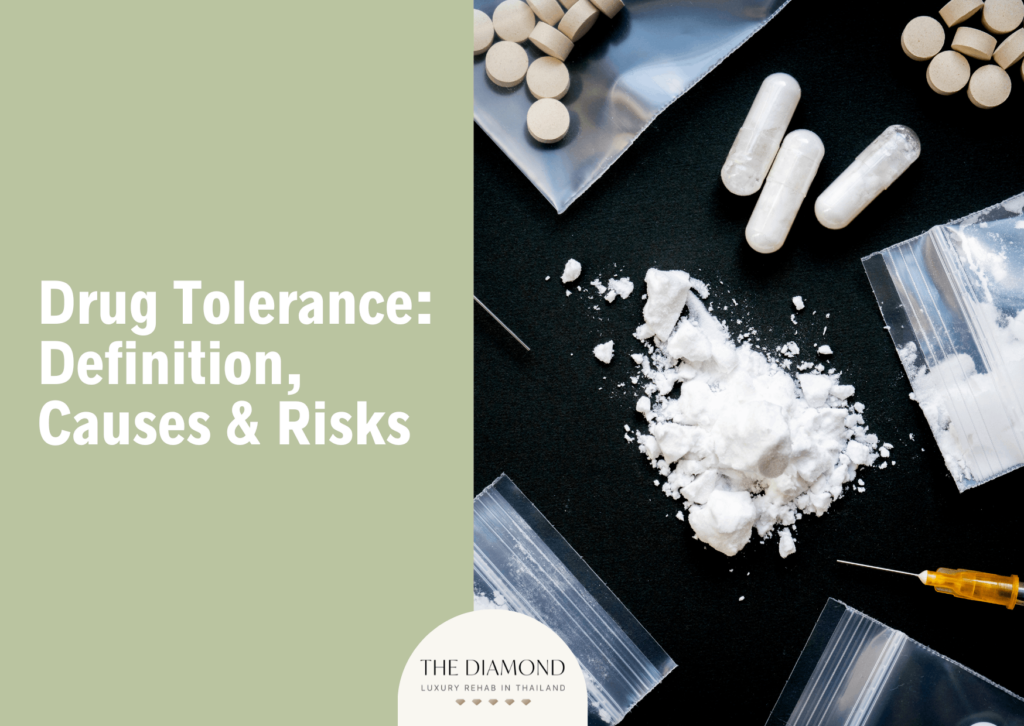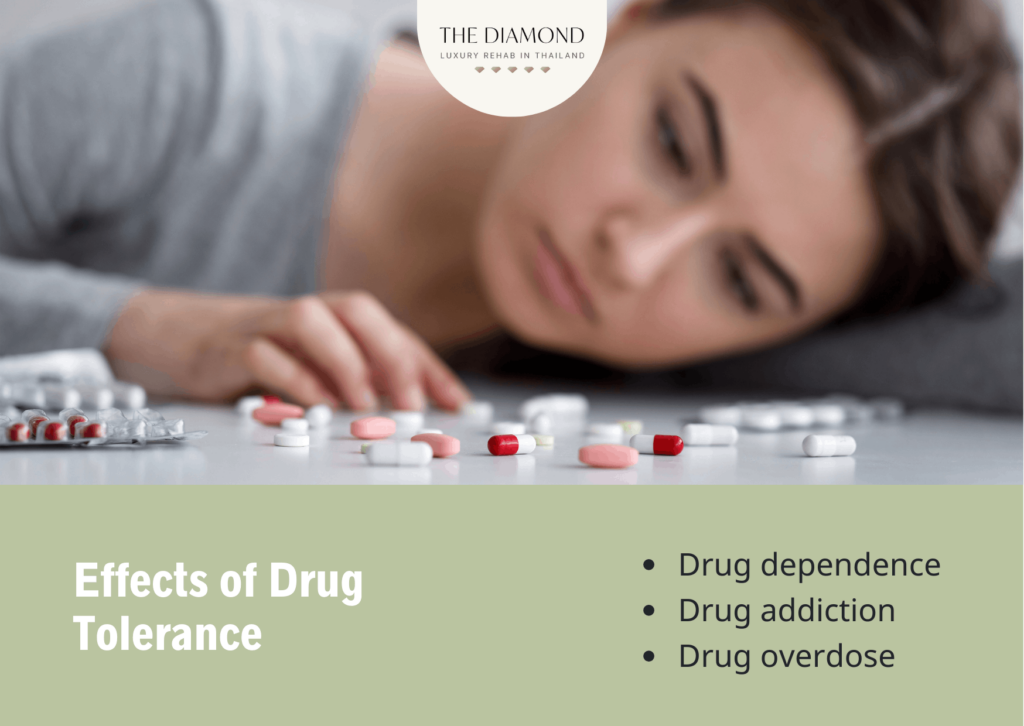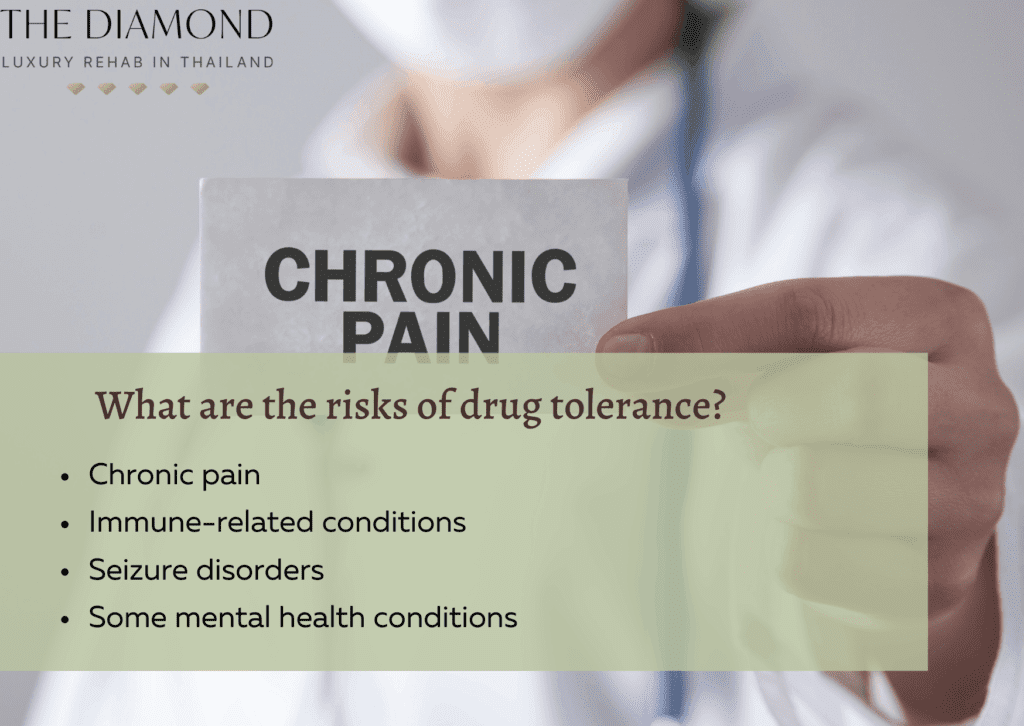Drug Tolerance: definition, causes and risks

Drug tolerance, also known as drug insensitivity, is a reduced reaction or diminished response to a drug. This can occur when a drug is used repeatedly. The body gets adapted to its continual presence.
The causes of drug tolerance are repeated and chronic use of the drugs. Additionally, using larger and larger doses can lead to drug tolerance.
Risks of drug tolerance include increased likelihood of overdose, addiction, and dependence on specific classes of drugs, such as opioids.
What is drug tolerance?
Drug tolerance is defined as the diminished response to a drug, alcohol, or other substance over the course of repeated or prolonged exposure. It is a physiological response to a drug that requires greater quantities to offer the same response.
Developing ‘tolerance’ to a certain drug means the body becomes accustomed to the drug in the system at the currently used dosage. It also means the drug becomes inefficient in managing a particular health problem. Developing tolerance also indicates the body or brain is not responding to the medication like it used to.
This problem can happen with both prescription medications and recreational drugs. The enzymes or receptors in the body and brain are less activated by the product. So, the drug doesn’t offer the necessary results.
The higher the tolerance and dependence of a drug, the bigger the doses a person would need to use. Otherwise, the body is incapable of achieving the same results as it did prior to developing tolerance. When dealing with any kind of substance tolerance, it’s important to consult a specialist.
How common is drug tolerance?
Drug tolerance is common among people who take the same drug for an extended period, Medical News Today explained. The most abused substances are alcohol, marijuana, hallucinogens, inhalants, and prescription medicines like anxiety pills, stimulants, and pain pills such as opiates.
According to the Ochsner Journal, drug tolerance has been increasing in recent years around the globe. This can make it difficult to find the right pain management strategy.
Opioid addiction and use disorder remain at the forefront of epidemic levels in the United States and the globe. About 3 million Americans and 16 million people worldwide are currently suffering or used to suffer from opioid use disorder (OUD). When it comes to OUD, according to a study from the Journal of Child & Adolescent Substance Abuse, 0.5% of adolescents enrolled in Medicaid or the Children’s Health Insurance Program had OUD. The same report also showed 3.0% of adolescents had risky opioid use, 3.4% had another substance use disorder (SUD), and 21.6% used substances without a disorder. As per the Clinical Journal of Pain, nonmedical use of opioids by children is a public health crisis. In fact, unintentional deaths related to opioid use affected 0.1 per 100,000 children (0-14 years).
Roughly 20 million people in the U.S. have substance-related disorders, and around 1/3 of the population is using illicit substances. Substance abuse is recorded in 25% to 40% of admitted patients. In most cases, substance abuse is more prevalent in men than women. According to Psychiatric Times, the worldwide prevalence of cannabis, amphetamine, cocaine, and opioid use among women was 0.14%, 0.18%, 0.06%, and 0.14%, respectively and in males, the prevalence was 0.23%, 0.31%, 0.14%, and 0.31%. In the United States, 12.8% of men and 7.3% of women aged 12 years or older reported past-month illicit drug use.
Based on results from the 2020 National Survey on Drug Use and Health by SAMHSA, among 12-year-olds or older, 58.7% (162.5 million) used illicit drugs, alcohol, and tobacco in the last month. They often spend a great deal of time obtaining the substances, using them, and recovering from their effects.
Although the use of illicit drugs tends to drop after young adulthood, almost 1 million older adults over 65, have a substance use disorder, according to the National Institute on Drug Abuse. The problem is, elderly people tend to metabolize substances very slowly. Therefore, their central nervous system is more sensitive to these substances.
What causes drug tolerance?
Causes of drug tolerance are repeated or chronic drug use and changes in receptor-mediated signaling. The latter refers to pharmacodynamic tolerance, a type of physiological tolerance, meaning that the chemistry of the brain became adjusted to that particular drug. This forces the drug to lose its capacity to modify brain activity.
On the other hand, repeated or chronic drug use is described as pharmacokinetic (metabolic) drug tolerance, meaning that more drug is necessary to obtain the desired result. This type of physiological tolerance happens with oral ingestion.
The effectiveness of a drug depends upon the patient’s lifestyle habits and comorbid conditions, the distribution of the product to specific parts or tissues, molecular structure, and the effects seen.
Psychological drug tolerance is different. It refers to the increase in dosages to experience the mental rewards of that particular drug. After long exposure to opioids, pain medicine, alcohol, or street drugs, the brain releases proteins that thwart the release of dopamine.
What effects does drug tolerance have?

The effects of drug tolerance can significantly affect a person’s quality of life. The biggest effects of drug tolerance are listed below:
- Drug dependence
- Drug addiction
- Drug overdose
1. Drug Dependence
Drug dependence means you’ve been abusing higher dosages of a drug with addictive properties and can’t function properly without it. Drug dependence can be either psychological or physical.
Psychological drug dependence manifests itself in the way a person behaves. This is a cognitive disorder involving emotionally-driven withdrawal symptoms such as showing signs of obsession, using drugs to cope with other life problems. The psychological dependency makes it harder to stop using. This is why people tend to abuse drugs even when they don’t have a health problem.
Physical drug dependence manifests in the way it physically affects the body. This kind of dependency causes changes in chemical levels in the brain. The addictive chemicals in the drugs are the ones affecting the brain. This can lead to a number of withdrawal symptoms, such as lack of sleep, seizures, trembling, and gastro-abdominal problems. Its impact could be dramatic and can easily spiral out of control.
Drug tolerance leads to dependence through a constant increase in the dosages to experience the same effects, which leads to the abovementioned physical and psychological symptoms. These symptoms make a person believe they need to continue using the drug. This is often called problematic use.
Furthermore, drug tolerance could affect the odds of side effects. For many people, drug tolerance is a way to reduce the risk of adverse reactions. But, that doesn’t always work. For instance, even if you are not feeling drunk after consuming a lot of alcohol, ethanol can still damage your brain. The damage increases the more you abuse the substance.
2. Drug addiction
Addiction and tolerance can go hand in hand. Tolerance to drugs results in the need to amplify the doses for better effect.
When a person becomes tolerant of prescription medicine, doctors often suggest higher dosages. But, the bigger the dose, the higher the odds of addiction. Of course, not all drugs are addictive. However, typically used products like opiates (Oxycodone) and amphetamines (Adderall) are.
Drug addiction is a disease. Drug tolerance is not. Someone who is addicted can’t stop using a substance. After a patient develops a drug addiction, they irrationally and stubbornly try to get the ideal “high”. When they can’t get the next dose, they often turn to illicit substances.
Drug misuse becomes drug abuse when a person continues using a substance despite its negative effects and consequences on their health. People start abusing the drug to get that euphoric “high” feeling.
They need to keep taking the drug to get the same effect. People with dependence may soon realize they can’t stop using the drug, which can turn into a full-blown addiction. For those dealing with tolerance to drug addiction, it’s crucial to talk to a specialist.
3. Drug overdose
Many factors can have a drastic impact on drug tolerance. Inconsistent access to drugs, shortages, disruptions in daily routines, and surroundings can all affect drug tolerance. They can also lead to a higher risk of overdose, particularly in individuals who use opioids.
If you don’t have a tolerance or have a lower tolerance, then just a small increase in doses can amplify the risk of a drug overdose.
If a person is aware of their drug tolerance, they might act overconfident. But, getting higher doses for a longer effect can make them lose control. At times such as these, people often mix different drugs. This can pose a threat to overall health and the risk of overdose.
According to recent facts about tolerance from CDC, almost 50% of drug overdose deaths involved the use of multiple drugs. Additionally, tolerance to a particular drug might also increase to other drugs in the same class. This is known as cross-tolerance.
If an anti-anxiety pill isn’t managing dopamine levels properly, then a person might become more resistant to illegal substances that amplify the exact neurotransmitter, like methamphetamine. Having a tolerance to methamphetamine is one of the first steps to developing a full-blown addiction, which is hard to control.
How to prevent drug tolerance?
In order to prevent drug tolerance, make sure to follow the tips listed below:
- Consult with a healthcare practitioner: ask a doctor whether take a break or stop using the drug. The quality and potency of the medication could change. If there is a risk of cross-tolerance, the doctor can suggest using a different type of drug.
- Use a journal: people who tend to forget the last time they took their medicine, may want to write it down in a journal. That way, it’s easier to keep track of their doses and avoid missing a dose or taking more than the recommended amount. Using notes or other apps on a phone is also practical.
- Consider using non-pharmacological products: while medicine remains a priority, especially in treating and managing serious illnesses, it could be practical to use natural products. They often contain potent ingredients and a lower side-effect profile.
- Get rid of unnecessary prescriptions: many people are keeping their unused medicine in the cabinet. But, if it’s well beyond its expiration date, it can do more harm than good.
What are the risks of drug tolerance?

The risks of drug tolerance are listed below:
- Chronic pain
- Immune-related conditions
- Seizure disorders
- Some mental health conditions
1. Chronic pain
Chronic pain is a serious health problem. Like any long-term health condition, it can lead to complications beyond the physical symptoms. It can worsen anxiety, and depression and may cause trouble sleeping.
People suffering from chronic pain often find it harder to keep up with daily activities and work, and the worse the pain, the bigger its impact. Opioids can be useful for treating acute and chronic pain. But, the real problem begins when the drug just can’t accommodate a person’s needs.
This is what happens with pain medication tolerance. Over time, people can build up a painkiller tolerance. Being opioid tolerant implies patients are chronically getting opioids daily.
They need more of the same opioid to obtain the same level of pain relief. Opioid tolerance is associated with chronic pain, not acute pain, even if increasing the dosages can happen with acute pain.
2. Immune-related conditions
Immune system is prone to a wide range of problems. For example, people can develop autoimmune diseases, allergies, and immune deficiencies. Eczema is a classic condition of an overactive immune system.
Corticosteroid solutions, creams, and ointments can help curb inflammation and itching. These products come in different strengths from mild OTC medicine to stronger prescription drugs. With corticosteroids, people can develop a tolerance over time particularly if they are taking frequent and higher dosages. This can affect their eczema treatment.
According to a research paper from Psychopharmacology Bulletin, dependence can also happen. Although it is unusual, it can be a serious complication of corticosteroid use.
NSAIDs are one of the most typically used medicines in adult patients. They are a go-to treatment for long-term health complications, such as osteoarthritis, rheumatoid arthritis, and lupus. The main types of NSAIDs include ibuprofen, celecoxib, and naproxen.
A study from Neural Regeneration Research mentions that systemic use of NSAIDs induces a decreased sensitivity to pain, with certain effects of tolerance. But, developing NSAIDs tolerance is fairly uncommon. Mainly because if the person taking pills is using them for a prolonged period, they could probably develop stomach problems before they experience a tolerance.
3. Seizure disorders
Patients with epilepsy find that over time, they need to take higher and higher doses of their prescribed seizure medication. This is to achieve the same result. This is a classic example of drug tolerance medical definition.
Reports in animal and human trials indicate that tolerance is not a big problem for the majority of antiepileptic drugs, Epilepsy Foundation reported. Most of those affected get proper seizure control while using the same dose. They can maintain the same blood levels of medicine.
There can be two cases in which tolerance can be a serious problem in the care of patients with epilepsy. The first is when the patient uses a specific antiepileptic drug that often has a high level of tolerance.
The most popular medications of this kind are benzodiazepines like diazepam, clonazepam, and lorazepam. These are very effective products for stopping seizures. But, they are mostly used in an emergency setting and not for long-term epilepsy treatment due to tolerance.
These products work very well for brief seizure control. However, their effectiveness subsides over weeks, months, or years while their adverse reactions continue. In patients who must use higher dosages to achieve the same degree of epilepsy control the adverse reactions can increase.
In other cases, in which tolerance can be important when caring for patients with epilepsy during the “honeymoon effect”. A honeymoon phase is a phase when a person can get away with having no seizures for a longer period. But, they come back again.
In certain patients, the effectiveness of medicine can wear off over time a lot more than for other people either because of the nature of their epilepsy or the way their bodies function. These patients can do relatively well with a change in medication. In that case, the effectiveness of the drug can start to reduce, and seizure control might be gradually lost. In cases such as these, it is critical to talk to a specialist. Patients might benefit from adjusting the timing of medication, distribution, or a combination of seizure drugs.
4. Some mental health conditions
Drug tolerance can worsen some mental health conditions or contribute to their development. A good example is Ativan, a drug approved for treating anxiety, sleep problems from anxiety, and stress. Ativan is a benzodiazepine meant for short-term relief of anxiety symptoms.
Tolerance can develop quickly to the sleep-inducing effects of this medicine. The muscle-relaxant and anticonvulsant effects last for a couple of weeks before a tolerance develops in a majority of patients. In this case, drug tolerance can lead to worsening anxiety and insomnia.
But, there is a range of different medicines used for different types of mental illness.
Tolerance to antidepressants, for example, can occur over time, quickly, or through long-term use. It can lead to depression relapse, irritability, increased thoughts of self-harm, worsening depression, and anxiety.
There is not enough research as to exactly what’s causing this antidepressant tolerance. But it can happen from long-term, short-term, intermittent use, and changes in medications and dose readjustments. When someone develops a tolerance, they might need to up their doses.
Is it possible to overcome drug tolerance?
No, it is not possible to overcome drug tolerance. A healthcare expert can help mitigate the problem by suggesting more frequent or higher doses of a specific drug. If that doesn’t work, the doctor can recommend weaning off the product. This means gradually reducing their doses so patients can stop taking the medication. So, they can use a different one.
When a patient needs extra supportive care, experts can recommend options like psychotherapy. During psychotherapy, patients can get a better perspective of their current condition as well as their behaviors, thoughts, feelings, moods, and emotions.

